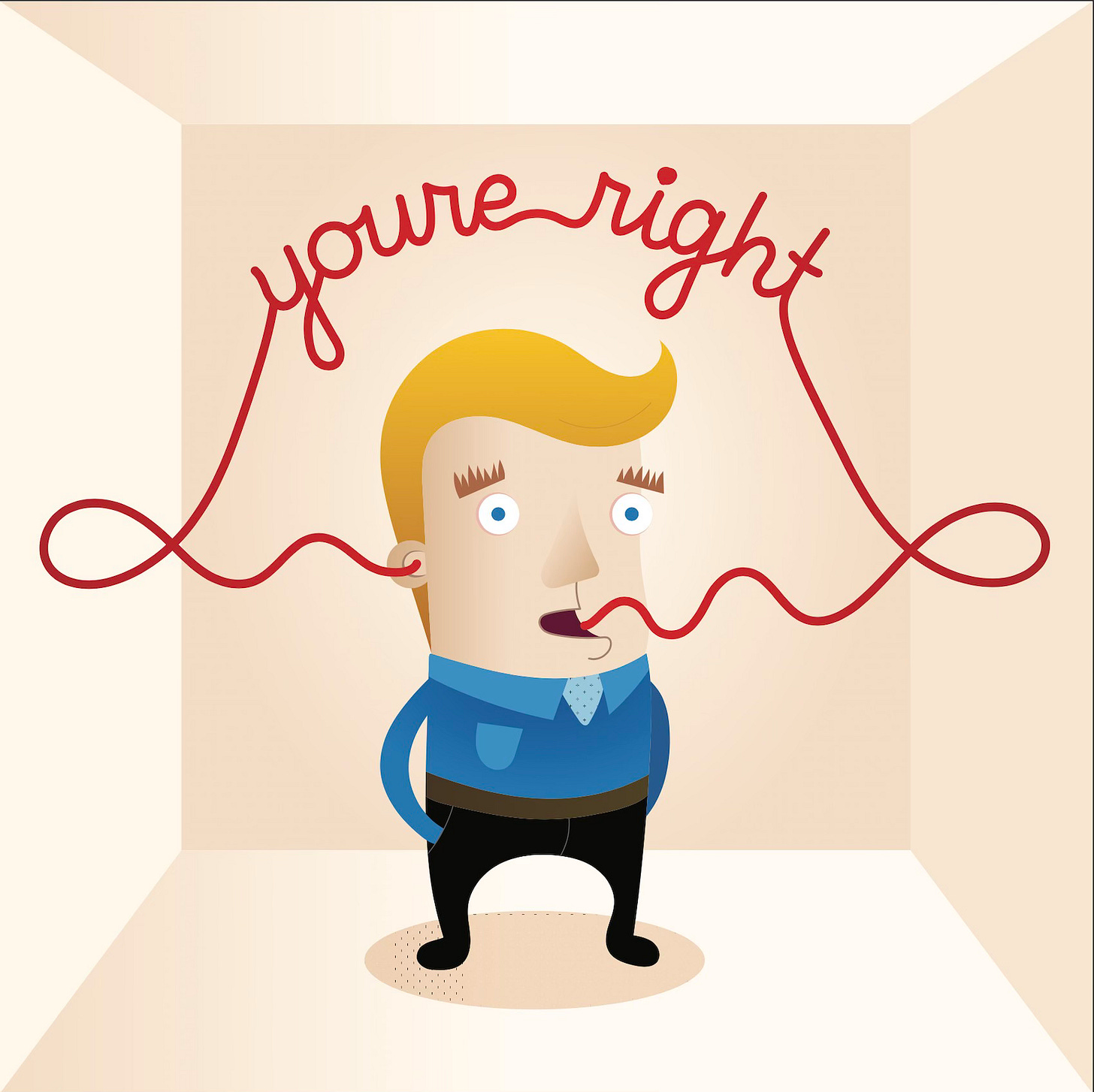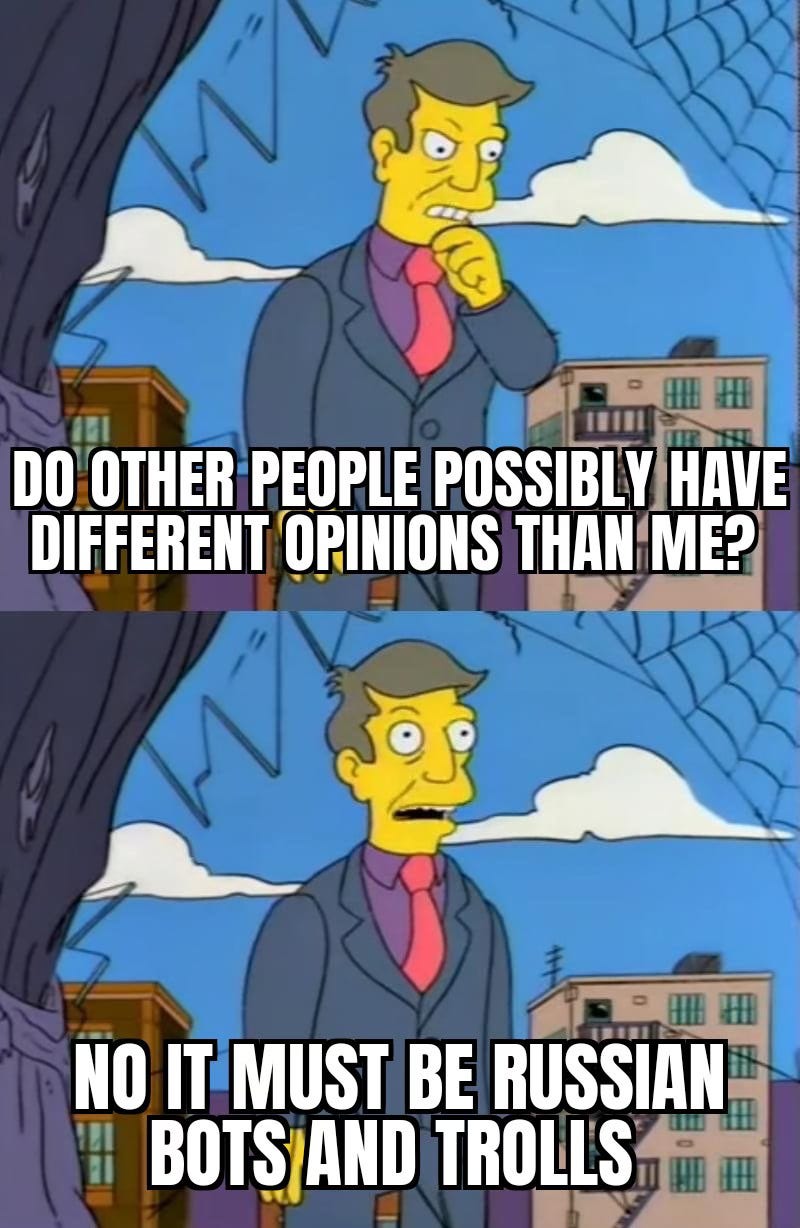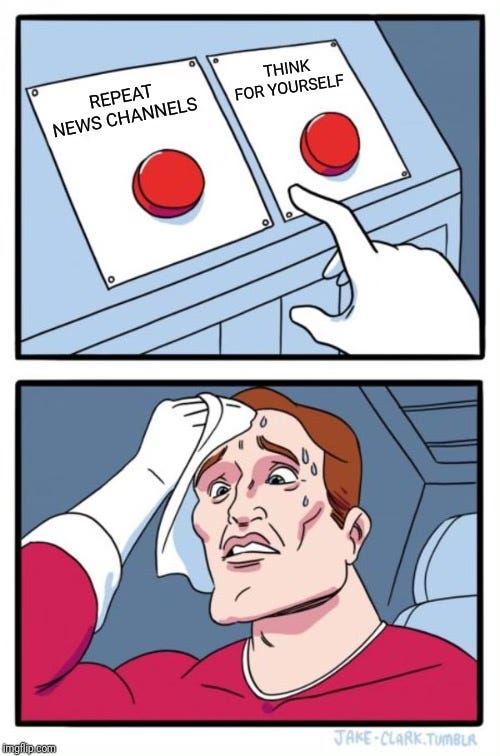Greetings From My Echo Chamber
The wake up call I needed from the Ivy League psychiatrist who thinks drugging more Americans would be progress.
I need to tell you something that's both humbling and terrifying: I've been living in a bubble. An echo chamber so perfectly constructed that I almost forgot what real resistance looks like. For months, I've been lulled into believing we were winning this fight against the medicalization of human suffering and mass drugging of humanity. My Substack growing, podcast downloads climbing, overwhelmingly positive feedback flowing in like a gentle river of validation. Even witnessing the MAHA movement finally expose the corruption fueling our chronic disease epidemic.
I thought we were experiencing a mass awakening. I was lulled into a dangerous complacency.
I was wrong.
This past week delivered a series of wake-up calls that shattered my comfortable illusion of progress. Let me walk you through what happened, because it reveals something crucial about the nature of ideological capture, and it's happening on both sides of this divide.
The Illusion Cracks
It started while evaluating my business and reviewing feedback from the community. Calls from concerned individuals and direct client feedback began revealing something that shattered my comfortable assumptions and forced me to confront the reality of my insulated world. I was encountering fierce resistance to my ideas (not abstract disagreement, but visceral, personal attacks from people who'd discovered my work).
The pattern was consistent: people had been indoctrinated for years that their 'mental illness' was a medical condition requiring lifelong pharmaceutical management. They'd fully adopted this identity and had zero motivation to consider that the drugs they were taking might actually be making them worse. When they encountered my perspective, they wanted assurance that I wasn't promoting 'dangerous' views that might threaten their carefully constructed medical narrative.
It's been a while since I encountered that perspective, the one suggesting my views are inherently dangerous. The delicious irony wasn't lost on me: my opinions supposedly hurt people, while those same individuals frantically pursue the next drug, higher dose, or fresh diagnosis that might finally make their suffering comprehensible. Apparently questioning pharmaceutical dependency is harmful, but actually being dependent on pharmaceuticals is healing
Then came an email that drove the point home even further. The writer called my ideas 'dangerous,' vaguely invoking 'far-right extremism' as the reason my views should be dismissed. She had cherry-picked lines from one of my articles, created an entire narrative about who I am and what I believe, then used that distorted caricature to dismiss everything I've written without actually engaging with the substance.
There it was. The reality I'd been insulated from. While my audience has grown more supportive, the broader culture remains firmly entrenched in these narratives I've been challenging. People aren't just disagreeing with my perspective. They're viewing it as a moral failing, a betrayal of vulnerable people, a regression to medieval thinking about mental health.
This reality check hit hard because I rarely encounter such resistance directly anymore. The self-selection process has created my bubble. A simple Google search reveals my positions in clear detail: articles, podcasts, social media posts all challenging psychiatric orthodoxy. If you're deeply entrenched in the medical model of mental illness, I'm the last psychologist you'd choose to work with. With that my client population is much different.
In today's cultural landscape, questioning the safety and efficacy of psychiatric drugs (which is documented in scientific journals) apparently makes you a right-wing extremist. Suggesting that humans possess innate resilience and healing capacity gets you labeled as someone who wants to drag us back to the dark ages. Pointing out that over 25% of Americans taking psychiatric medications might indicate a systemic problem rather than scientific progress? Well, that's just dangerous thinking from someone who clearly hates people with 'mental illness'.
The irony wasn't lost on me. Here I am, a mental health professional with over two decades of experience, being characterized as anti-mental health for questioning the very system that's presided over skyrocketing rates of depression, anxiety, and suicide despite unprecedented pharmaceutical intervention.
This disconnect left me staring into an abyss of collective madness. How do we sustain the breathtaking illusion that our civilization isn't collapsing in real time? Every metric that matters reveals accelerating decay: a culture decomposing mentally, physically, and spiritually before our eyes.
Yet like addicts begging for another hit, people frantically demand more of the very toxins killing them: processed poison masquerading as food, mind-numbing entertainment, psychiatric chemicals, authoritarian medical control, expanded government power. We fund genocide abroad while chemically lobotomizing our own citizens at home, and somehow convince ourselves this represents human evolution rather than civilizational suicide. And I am extreme?
The Echo Chamber Revealed
Then came the confirmation that my echo chamber was real. My most recent article (where I discussed our cultural desensitization to sexual content, casual discussions of genocide, and medical propaganda) became my most-read piece. The comments revealed something fascinating: what I considered obvious observations about cultural decay were apparently controversial viewpoints.
Suggesting that celebrating sexually transmitted diseases might not represent empowerment? Controversial.
Questioning whether casual talk of "blowing countries off the face of the earth" might be spiritually corrosive? Apparently extreme.
Wondering if convincing vulnerable adolescents they were born in the wrong body and halting puberty might not be compassionate care without devastating consequences? The mark of a dangerous transphobic ideologue.
Reading through hundreds of comments, I realized I'd been living in a carefully curated reality where my perspectives felt normal, reasonable, even inevitable. The algorithm had created a perfect feedback loop, showing me content and connecting me with people who already agreed with my fundamental premises about human nature, healing, and the dangers of pharmaceutical psychiatry.
Meanwhile, in academic institutions, major medical centers, and countless therapy offices across America, the narrative I challenge is being reinforced daily. Probably even growing in scope. Students are taught that questioning psychiatric orthodoxy is anti-science. Residents learn to see human suffering through the lens of DSM categories and pharmacological solutions. Young therapists are trained to validate diagnoses rather than explore the possibility of growth through difficulty.
The Debate That Broke My Brain
But the real wake-up call came during a two-hour conversation with a prominent academic psychiatrist from an Ivy League institution. This episode, which will be released in a few weeks, was simultaneously enlightening and deeply disturbing.
Here was a man with impeccable credentials, decades of experience, and genuine authority in his field. The guy you see on Fox News, CNN and MSNBC. And for two hours, he defended every aspect of modern psychiatric practice with unwavering confidence.
Chemical imbalance theory? Established science.
Psychiatric medications? Safe and effective.
The explosion in mental health diagnoses? Evidence of reduced stigma and better recognition of previously untreated conditions.
When I presented critical analysis questioning these narratives, he didn't counter with evidence or engage the substance of my arguments. Instead, he dismissed my assertions with the intellectual arrogance that can only come from the 'trust the science' crowd:
“This has been proven.”
“We know this by now.”
“The research is clear.”
That was it. No examination of limitations, no acknowledgment of conflicting data, no critical analysis. Just the condescending certainty of someone perched on the academic mountaintop, expecting those of us in the valley to simply bow to his authority rather than demand actual evidence.
When I pointed to the correlation between increased psychiatric medication use and worsening mental health outcomes, he dismissed it as coincidence.
When I cited international drug regulatory agencies black box warnings about increased suicide and violence in patients taking SSRIs, he looked me straight in the eye and insisted these same drugs actually PREVENT suicide. Think about that for a moment: an Ivy League psychiatrist dismissing official warnings from every major drug regulatory agency in the western world while claiming the medications that carry suicide warnings somehow PREVENT suicide. It was like watching someone argue that cigarettes cure lung cancer while holding the surgeon general's warning in their hand.
This was deeply concerning because this represents the exact crowd that worships government authority. These are the people who reflexively cite FDA approval as ironclad proof of drug safety, who live and breathe official guidelines, who consistently demand more regulatory oversight. Yet the moment those same government agencies issued warnings that contradicted his narrative, he dismissed them without hesitation. The hypocrisy was staggering: trust the science when it supports your position, ignore it when it doesn't.
When I discussed the lack of biological markers for psychiatric diagnoses, he insisted the conditions were nonetheless 'real medical illnesses' and dismissed my concerns entirely. The look on his face suggested he was encountering this inconvenient fact for the first time. I was authentically confused.
His expression reminded me of a toddler being offered broccoli for the first time, equal parts fascination and revulsion. Here was a fundamental challenge to his entire professional worldview, and his brain seemed to be short-circuiting in real time, unable to process information that threatened the very foundation of his expertise.
I had that thought again I might be in a simulation.
Most remarkably, he argued that we need to drug MORE people, not fewer. In his view, 40% of Americans suffering from ‘mental illness’ (his statistic not mine) represents an opportunity for expanded pharmaceutical intervention, not evidence of a failing paradigm.
I'll be honest. I lost my professional composure at times. Decades of watching this system harm people, combined with the cognitive dissonance of hearing these arguments presented as established fact, triggered something in me. I felt anger rising, frustration at the circular logic, disbelief at the denial of obvious evidence. I realize I must develop more effective strategies for engaging with intelligent people who maintain logically incoherent positions that cause real human suffering.
As I left the house to record this episode, my wife's parting words were: 'Don't be a dick.' I laughed, but her message was crystal clear. She knows my tendency to lose patience with intellectual dishonesty, and she was essentially saying, 'Remember, you catch more flies with honey than vinegar.'
I failed. I think I was a dick.
What truly disturbed me was realizing this wasn't a monster. This was a genuinely kind, thoughtful man who seemed to care deeply about helping people. We couldn't have disagreed more fundamentally about the nature of mental health and healing, yet he came across as gentle, well-intentioned, even likeable.
I genuinely felt sympathy for him afterward. He had repeatedly contradicted himself, undermined his own arguments, and by the conversation's end, had essentially discredited the validity of his own research
This realization was more disturbing than if he'd been an obvious villain. It revealed the true power of ideological capture: how good people can become unwitting agents of systems that cause harm, all while believing they're serving the greater good.
The Comfortable Lie vs. The Difficult Truth
What I witnessed in that conversation was the human capacity to deny evidence in order to maintain a worldview that provides security, status, and meaning. This psychiatrist lives in an echo chamber much more complete and more powerful than mine had become. He's surrounded by colleagues who reinforce his beliefs, institutions that validate his approach, and a professional identity built on the assumption that his methods represent scientific progress.
To question the fundamental premises of psychiatric medicine would require him to confront the possibility that his life's work might be contributing to suffering rather than alleviating it. That the patients he's medicated for decades might have been harmed rather than helped. That his prestigious position might be built on pseudoscience rather than medical breakthrough.
Who among us has the courage for that level of self-examination? Not many unfortunately.
But here's the crucial difference between our echo chambers: the evidence increasingly supports the conclusion that our current approach to mental health is failing catastrophically. We have more people diagnosed with mental illness, taking psychiatric medications, and struggling with chronic mental health conditions than at any point in human history. Suicide rates continue climbing despite unprecedented access to psychiatric care.
We're chemically sedating four-year-olds for having the audacity to act like four-year-olds. Preschoolers are leaving pediatric appointments with multiple psychiatric prescriptions for the crime of being energetic, emotional, or inconvenient to adults who've forgotten what childhood looks like. We've weaponized medicine against our own children's developing brains.
The comfortable lie is that this represents progress: that we're finally treating previously unrecognized medical conditions with safe, effective medications. The difficult truth is that we've medicalized the human experience to a degree that disconnects people from their own emotional wisdom, resilience, and capacity for growth through adversity.
The Danger of All Echo Chambers
This experience taught me something essential about the nature of belief systems and the dangers they pose when left unchallenged. My echo chamber, filled with people questioning psychiatric orthodoxy, had made me complacent. I'd grown soft, comfortable in my convictions, insufficiently prepared for the reality that most people still embrace narratives I consider obviously false.
But the psychiatrist's echo chamber doesn't just spread delusion. It has the power to enforce it. It controls what medical students learn, determines which treatments insurance companies cover, and influences laws that can force medications on unwilling patients. When your echo chamber can legally drug people against their will and call it healthcare, the stakes become existential.
You know what, though? I'm grateful for this week's experiences. The anger I felt during that debate with the psychiatrist reminded me why this work matters so deeply. The resistance my staff described encountering reminded me that we're fighting against powerful institutional forces, not just individual misunderstandings. The controversy around my cultural observations reminded me that speaking truth in a culture of lies will always provoke strong reactions.
My edge is back. The comfortable numbness of positive feedback has been replaced by the sharp clarity that comes from remembering what we're up against. I'd grown soft in my echo chamber, lulled into believing that reasonable people naturally gravitate toward logic and evidence. This week reminded me that reasonable people can be captured by unreasonable systems, and that challenging those systems requires courage, persistence, and a thick skin.
I want to be challenged. I want people to present their strongest arguments for the psychiatric model. I want to engage with the most thoughtful defenders of current practice. Not because I expect to change my fundamental perspective (the evidence is too overwhelming) but because intellectual combat sharpens thinking and reveals weaknesses in arguments.
The psychiatrist I debated this week wasn't evil, but his capacity to deny obvious evidence while maintaining absolute confidence in his position was genuinely frightening. It revealed how intelligent, well-meaning people can become unwitting agents of systems that cause immense harm.
This is the real danger of echo chambers: they don't just shield us from opposing viewpoints. They insulate us from the reality of how deeply entrenched those opposing viewpoints have become. They make us complacent when we should be urgent, comfortable when we should be fierce, optimistic when we should be soberly realistic about the magnitude of the challenge we face.
The Path Forward
So where does this leave us? Fighting a system that has convinced millions of people that their emotional struggles represent medical illnesses requiring lifelong pharmaceutical management. Challenging institutions that profit from pathologizing normal human experience. Confronting a culture that increasingly sees psychiatric diagnoses as identity markers rather than temporary descriptions of distress.
But we're also offering something profoundly hopeful: the recognition that humans possess incredible capacity for healing, growth, and transformation when given the right conditions. That emotional pain, while genuinely difficult, often carries wisdom about what needs to change in our lives. That the struggles everyone faces (loss, disappointment, uncertainty, conflict) aren't evidence of brain dysfunction but opportunities for developing resilience, compassion, and deeper understanding of what it means to be human.
The echo chamber taught me that progress isn't measured by how many people already agree with you. It's measured by how effectively you can reach those who don't. It's not about preaching to the choir but about offering an alternative vision to people trapped in systems that promise healing while delivering dependence.
This is where I need to improve my strategy. Sharpen my skills. Improve my ability to nudge people out of the delusion.
The comfortable bubble nearly made me forget how radical these ideas sound to people immersed in psychiatric orthodoxy. This week reminded me that questioning the medicalization of human suffering isn't just alternative thinking. In today's culture, it's revolutionary action.
So bring on the resistance. Challenge every assertion. Demand evidence for every claim. The truth can handle the scrutiny. In fact, it gets stronger under pressure.
Greetings from outside my echo chamber.
The view is much clearer from here.
I try to keep RADICALLY GENUINE as free as I can, but it takes quite a lot of work. If you find some value in my writing and podcast I very much appreciate the paid subscription. It really helps me continue putting time aside for these pieces. Thank you.










Well said. The trouble is you are questioning their narrative which is a direct challenge to their authority. Please don't stop.
It doesn't just apply to Psychiatry though but all branches of medicine. But should I say let's have a proper discussion about statins, proton pump inhibitors and vaccines I'll be shot down in flames particularly in respect of the last one. Yep i'm just a 'conspiracy theorist' to use the weaponised term. When all I'm saying is lets remove the 'Big Pharma' money from the equation and do some proper studies.
Shouldn't be too hard to find two groups of a few thousand children, one group following vaccination schedules and the other unvaccinated. Do the statistical work to correct for confounding factors and then follow the health outcomes of both groups over a number of years.
It'll never happen though, Big Pharma will see to that.